
Filmska obrada klasika intelektualističke proze, Homo fabera, Maxa Frischa.
Treba li priznati vrijednost emocijama, osjećajima i snovima?
Walter Faber has survived a crash with an airplane. His next trip is by ship. On board this ship he meets the enchanting Sabeth and they have a passionate love affair. Together they travel to her home in Greece, but the rational Faber doesn't know what fate has in mind for him for past doings.
Scorpion Releasing's best DVD yet is Volker Schlöndorff's 1991 Voyager (original title Homo Faber), an uncompromised adaptation of a novel by Max Frisch. A very personal film about a rootless man's sudden plunge into emotionalism, Voyager uses what some might consider rather obvious coincidences to explore the nature of regretfulness, and the inability to recover the past. Starring a subdued Sam Shepard and filmed with a literary detachment, the film positively glows thanks to the presence of 20 year-old Julie Delpy, who single-handedly gives the film the breath of life and the warmth of love. An overlooked commercial non-performer, Voyager is a very pleasurable experience.
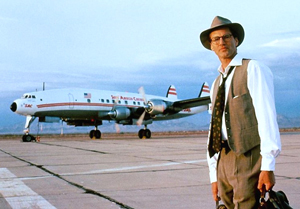
It is 1957. Dry, rational Walter Faber (Sam Shepard) narrates part of his own story and is himself stunned by the crazy coincidences fate puts in his past. An engineer building a dam in Venezuela, Faber decides to break off with his girlfriend in New York by writing her a letter. Walter's ability to compartmentalize his love affairs is explained in a flashback to Germany in 1937. When his girlfriend Hannah (Barbara Sukowa of Fassbinder's Lola) became pregnant, Walter first suggested abortion, and then offered to marry her. Furious, Hannah instead marries their best friend Joachim (August Zirner).
Faber has no problem meeting women, including the stewardess on a Mexican airplane that is forced to crash-land near Tampico. While waiting for rescue, Faber discovers that fellow passenger Herbert Hencke (Dieter Kirchlechner) is Joachim's brother. As Faber has never found out what became of Joachim and Hannah, he accompanies Herbert to Joachim's tobacco plantation.
Later, Walter literally ditches his New York girlfriend in the middle of a lobster dinner and hops a boat to Paris. On board he meets a charming, radiant girl that breaks through his defenses and prejudices about women and relationships. She's Elizabeth (Julie Delpy), who Faber "renames" as Sabeth. Faber at first takes a paternal attitude when Sabeth announces her intention to hitchhike to Italy before joining her mother in Athens. By the time they begin the trip, Faber has already proposed marriage.
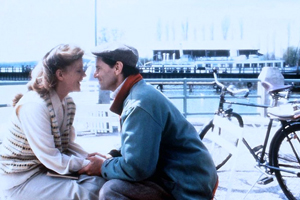
Despite its personal mysteries and globe-hopping sense of adventure, Voyager is structured as a novel, not a movie thriller. Walter Faber is an ordinary man with strengths and weaknesses, and a very un-heroic cynicism in regard to relationships. The movie also doesn't pretend that all of its mysteries are going to be explained. The suspicious, rather horrible death of one character must be accepted for what it is: nobody feels compelled to dig into what exactly happened. The narrative also sees little need to find conventional closure for the characters left at the finale. The focus is on the Walter Faber character.
Walter Faber jumps across the globe building dams and addressing conferences, but the center of Voyager is his rebirth as a romantic believer. In this the film is 100% successful, despite the limited performing range of Sam Shepard. Faber is a quiet man who retreats into silence when his emotions are challenged; only when he's been drinking does he feel the need to respond to other people's opinions. His fellow boat passengers find him attractive but anti-social.
Sabeth is traveling in the company of a boyfriend, who remarks on her independent nature. Intrigued by Faber's disinterest in the world of art, Sabeth starts spending more time with him. Walter is fascinated by Sabeth's almost ethereal connection to life; her behavior goes beyond the innocence of youth to express a deeper understanding. Delpy's performance is captivating in the extreme. The actresses's refreshing turns in the much better known Before Sunrise and Before Sunset movies seem calculated in comparison. Voyager is an older man's story about memories of youthful love, and this Sabeth/Julie Delpy creation brings those 'first girlfriend' memories back fresh and strong. We even forgive the novelistic conclusion, that reminds us that this is a tale of regret as experienced by a lonely man, who thought he didn't need people but suddenly cannot do without "that special person". Since we have experienced the joy of Sabeth as well, we fully understand Walter Faber's emotionally paralyzed condition.
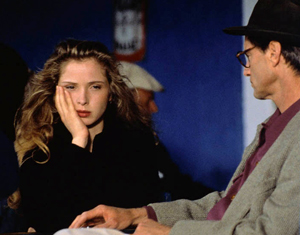
Volker Schlöndorff is the least predictable and most international of the "new" German directors of his day. Working with the author and screenwriter Rudy Wurlitzer (Two-Lane Blacktop), Schlöndorff does a fine job of creating a 1957 ambience without Hollywood trappings -- no hundreds of extras, no matte paintings. The production helped revive an extinct Constellation "Connie" prop airliner for the movie, and staged an impressive desert crash without special effects. Glimpses of New York streets give an impression of late-50s cars, and a few costumes do the rest. Walter Faber seems to spend his life waiting around in airline terminals, at a time when people dressed up to fly. Shooting in Mexico, New York, Italy, Greece and points between give the movie a proper "road" feel. The only time we feel slightly cheated for realism is when Faber apparently checks onto a Paris-bound boat on a whim. We don't see him return home to deal with his girlfriend first, but he somehow has his full traveling gear with him when the boat debarks.
| Voyager Summary by Kevin Lueng |
|
The first few minutes of VOYAGER is
revealing of everything that is to
come. It opens black-and-white, outside a generic
50-ish airport populated by
generic 50-ish people and automobiles. The voyager shows
up, hugs this handsome woman
farewell, sits down in the utterly familiar waiting
room, and buries his head in
his hands in a sea of felt hats and cigarette smoke,
thinking of a certain woman
who no longer exists. He does not want to be there or
anywhere.
Then color filters back on screen as
the camera takes him two months back in
time, to another waiting room straight out of
faded photographs, poised to miss
another plane. Over and over again the film would
echo this strong sense of
spatial dislocation, address the circular nature of
time, narrate the story as
some sort of a chronicle of a death foretold and of
human endeavors foredoomed,
and enhance it with flashbacks and voice-overs by
someone precisely situated in
a certain period in history and thus make the events twice removed from us, and do all of these with plenty of sardonic humor and self-irony. It is a good, solid beginning for a much overlooked, excellent film. Sam Shepard plays the voyager, Walter Faber, a globe-trotting American engineer who sets his bearings by his faith in technology and treats metaphysics as an exercise in the laws of probability. He carries with him a bored, presumptuous air which of course makes him irresistible to women. We watch him snatched and shepherded aboard a gorgeous propeller plane, turn into an entry in plane-crash statistics, survive the landing, and become witness to a suicide in a strange land - all appropriately meaningless and absurd, except that they call to him memories of a woman he once knew before the war, Hanna, whom he sees in crisp flashbacks. He returns to civilization, haunted by memories. The "train of coincidence" runs on; he hops on a boat to France to escape a female acquaintance and to resume his anonymous, moment-to-moment existence atop the bell-shaped curve. Instead, he runs into a young woman he names "Sabeth" who reminds him of his lost love. She is something of a paradox, this Sabeth, terribly young and vulnerable, a lover of ancient art and its timeless mysteries, and at the same time devoted to Camus and Sartre, those unabashedly contemporary writers who write of freedom and transparency and of experiences created ex-nihilo, unencumbered by a troublesome past. He sees her a lot, and there are some delicate scenes of glances exchanged in crowded ballrooms and slow-dancing on the moonlit deck. (The soundtrack is moody but very pretty.) Stranded on an oceanliner in the middle of the Atlantic, the voyager who shuns entanglements finds himself locked on to this young woman, a beckon that arose from the depths of his past and destined to guide him to complete an act of destruction he set into motion some twenty years ago. They land in Paris where Faber delivers speeches on the Future of Mankind and stalks Sabeth in art museums. They encounter the inevitable scuffles in Parisian cafes and graffiti protesting the Algerian war. The heart of the film consists of the couple's journey across the continent, from metropolitan Paris, through blazing wheat-fields in the south of France, to nameless historic Roman ruins in Florence and Rome, finally to arrive at the ancient villages of Greece. Along the way are scattered sequences of great tenderness and discipline graced with extremely evocative camera work. In Athens they are touched by tragedy and reunite with Hanna; swiftly unfolding events bridge the twenty years that separates them, and simultaneously the memories that has been tormenting Faber passes into the present. The acting is particularly impressive in this more somber half of the film: e.g,. Delpy's Sabeth sitting dry-eyed and crushed in the cafe where Faber left her; Shepard and Barbara Sukowa's Hanna maneuvering to wait each other out over dinner; it is all quite extraordinarily restrained and dignified. There is something about the adaptation (or maybe it is the cinematography) that makes the tale's symbolic dimension leap off the screen and highlights the cyclic quality of this improbable tale of strong-willed, self-centered people forging their fate only to get ensnared by it. Yet the characters never come across as mere mechanical parts reenacting an ancient drama, nor do Faber's relations with Sabeth or Hanna seem at any time less than genuine. |
| Reviews |
|
Jeff Shannon,
Seattle Times:
"Perfectly cast as American engineer Walter Faber, Sam Shepard captures the lost, soul-searching qualities of a middle-aged man who fools himself by thinking he can 'see things as they really are, without dreaming.'... Schlondorff nicely balances Shepard's weariness with Delpy's radiant, rejuvenating spirit. Challenged by an impulsively aimless anti-hero, Schlondorff and Shepard invest this wandering drama with charm and refreshingly discreet romanticism. The film is often soothingly dreamlike, worldly but free from the world, and although Faber remains enigmatic and distant, Shepard manages to convey the character's inner struggle with his trademark, low-key style, leading his memorable performance to a quiet moment of devastation."
Ron Holloway,
Hollywood Reporter:
"Shepard gives an even and convincing performance as the tired intellectual searching for a new meaning to his life. But it's young French actress Delpy - a discovery of Jean-Luc Godard in his recent 'Lear' adaptation - who steals the show as the seductively carefree Sabeth."
Soren Andersen,
News Tribune:
"Shepard's dryly enigmatic acting style is remarkably well-suited to playing a man who uses rationality to shut himself off from his emotions and to distance himself from all those around him. The character takes a parched pride in being a man with no dreams, and Shepard conveys that sense of an imagination tucked away in cold storage with impressive precision. Delpy's character is everything Shepard's is not: mercurial, passionate and very much attuned to both her own inner emotions and those of others. Her performance is arresting."
Desson Howe, Washington
Post:
"As an Americanized version of Frisch's erstwhile Swiss engineer, Sam Shepard is respectable for being effortless. His slightly goofy quality and one-sided knowledge of kilowatts and hydraulics help take the edge off his cover-boy features."
Michael
Wilmington, Newsday:
"Wurlitzer writes Faber as a hipster Gary Cooper, a rough-hewn, homespun, educated roamer full of salty, wry comebacks. Shepard responds with one of his best performances, maybe his very best. His comic timing has a lazy perfection and his collision with Delpy, who seems as fragile in his arms as a bird being cradled against the wind, brings out a tenderness, a quiet exaltation and remorse that make both his role and the movie memorable."
Hal Hinson,
Washington Post:
"In Volker Schloendorff's 'Voyager,' Sam Shepard's lanky frame is bent into a melancholy curve from the weight of existential pressures. Faber is the sort of mysterious, emblematic type that Shepard often plays; he is not so much a real person as a collection of associations, a skeleton on which the flesh of myth is hung. In this case, the iconography comes from the '50s, in which most of the story is set, the decade of Sartre and Camus; when Shepard tugs on the brim of his gray fedora, he's slipping into the familiar costume of the loner plagued with spiritual doubt and intellectual fatigue. It's as if he had a copy of "The Stranger" pinned to his lapel."
Variety:
"Equal parts road movie and Greek tragedy, Volker Schlondorff's latest literary adaptation makes good use of fine material... Sam Shepard is ideal as Faber, the quintessentially cool cowboy-loner-businessman."
Chris Hicks,
Deseret News:
"Shepard is a very interesting leading man here, and Delpy is very natural and quite beguiling." Film critics Frederic & Mary Ann Brussat: "Sam Shepard, in his best performance in years, plays a world-weary engineer who travels the globe in order to avoid any entangling relationships... On an ocean voyage, he meets Sabeth (Julie Delpy), an alluring young woman who desperately tries to thaw this ice man who refuses to acknowledge the value of feelings, dreams, and emotions. 'Voyager' impresses with its top-drawer performances, its globe-trotting sophistication, and its literary treatment of fate."
Owen
Gleiberman, Entertainment Weekly:
"Sam Shepard brings his laconic all-American sexiness to the role of Faber, an aimless, globe-trotting engineer... Delpy has a delicate amorous sweetness. Shepard, on the other hand, slips into the art-house blues all too convincingly. He gives a perfectly accomplished performance as a man who never quite expresses what's on his mind." Film critic Terry Lawson: "Shepard's cultivated emptiness is not all that detrimental to 'Voyager's' first two-thirds, in which Schlondorff and his cast do a fine job of approximating the existentialist angst of the era. Schlondorff and American screenwriter Rudy Wurlitzer have taken some mild liberties with Frisch's text, but in all important respects it remains true to the precepts of the novel, incorporating all its air, water and earth symbology while steadfastly refusing to moralize about Faber and his dilemma."
Deborah J. Kunk, St. Paul Pioneer
Press:
This period piece, set in the late 1950s, offers Sam Shepard a role in which the character he plays hangs as comfortably from his shoulders as a hand-tailored '50s suit... The real reason to see 'Voyager'' is to watch Shepard add layers to his homo faber, an ironic title that means, 'a man who forges his own fate.'"
William Arnold, Seattle
Post-Intelligencer:
"The succession of improbabilities link up to be a fascinating parable about the inescapability of one's own fate. Faber's education also works as an eerie metaphor for the collapse of scientific rationalism. The film is also worth seeing for the best performance to date from actor/playwright Shepard, who guides us along this travelogue with a wonderfully wry voice-over narration. He captures every psychological level of this prototypically (and anachronistic) American character without a single false beat."
Jeff Strickler, Minneapolis Star
Tribune:
Director Volker Schlondorff has done an impressive job of dealing with two time frames simultaneously, seamlessly inserting flashbacks to tell the subplot without ever losing the momentum of the main story."
Salt Lake Tribune:
"'Voyager' is a seductive narrative about existential questions and life's inexplicable coincidences. It is mesmerizing, with Sam Shepard delivering a cool and mysterious performance as a globe-trotting engineer whose past is about to catch up with him... It is provocative and supremely acted."
David Elliott, San Diego
Union-Tribune:
"Volker Schlondorff's film has an almost miraculous maturity, and even as the story darkens from its bright intensities, you can feel a sobering elation...Walter (Shepard) is a model loner, a self-enclosed technocrat, like an Ayn Rand hero shorn of rhetoric. He says with bland conviction: 'I don't read fiction ... I don't dream, either"... Shepard has never been more Gary Cooperish, more rightly cast, more laconically expressive - he evades commitment. He ducks a clutchy lover for a sudden ocean trip to Europe, and on board complains of 'five days without a car.'"
Desmond Ryan, Philiadelphia
Inquirer:
"On the surface, Shepard is such a reticent actor one suspects his drink of choice to be gin-and-laconic. But with the right material and a trusting director, his minimalist style generates extraordinary power. He is a master of speaking volumes through things unsaid and Faber is a role tailored to his gift. In Greece, where the classic tragedians wrote of heroes whose hubris led them to defy the gods, Faber suffers a modern equivalent of their fate. With Voyager, Schlondorff gives new and chilling meaning to the aphorism that those who forget the mistakes of the past will live to repeat them."
Joe Baltake, Sacramento Bee:
"A a Sam Shepard vehicle, it's just about perfect...'Voyager' is a one-man film about that man's journey of self-discovery, an angst-ridden melodrama, one that's reminiscent of some of Michelangelo Antonioni's films and that takes full advantage of Shepard's stoic, brooding, thinking man quality... Shepard portrays a soul-sick engineer/wanderer oozing his lean, laconic all-American cowboy sexiness. He's Walter Faber, a pragmatist with a bad case of malaise, haunted like Fitzgerald's Jay Gatsby by a life he foolishly sacrificed for things that he thought were important." Howie Movshovitz, Denver Post: Schlondorff gives Faber (Shepard) a wispy, out-of-the-world look... What's fascinating is to see how that direction unfolds and what makes Faber wake to it. With its emotionally distant hero, 'Voyager' has a profound emotional impact. His meeting with Elizabeth is one of the most touching visual descriptions of a beginning romance I've seen on film." Roger Ebert, Chicago Sun Times: "'Voyager' starts in mystery, and intrigues us. It continues with intelligence, and absorbs us."
Linda Deutsch, Tampa Tribune:
"Sam Shepard may be the film world's most fascinating chameleon. He changes from writer to director to actor and manages to do all of it astonishingly well. In 'Voyager,'' Shepard the actor turns in perhaps the most impressive performance of his career in a film." Hal Lipper, St. Petersburg Times: "The coldness that Shepard has always brought to his characters works to 'Voyager's' advantage. Delpy, one of France's leading actresses, captures Sabeth's ease and spontaneity. 'Voyager isn't top-tier Schlondorff, ultimately failing dramatically and to a degree, philosophically, but it is a compelling journey nonetheless."
Joanna Connors, Cleveland Plain
Dealer:
"The lean Shepard, with his loosened tie, horn-rimmed glasses and fedora, looks like Arthur Miller in his Marilyn Monroe years, an anguished intellectual. The production design evokes the dualistic style of the era, anonymous sterility in public spaces, a kind of garish, forced gaiety in private. Even the film stock seems to date from then, with its slightly grainy texture and faded colors."
Stephen Hunter, Baltimore Sun:
"Shepard the icon is perfect for the part, with that lanky American diffidence, that raspy, laconic way of speaking."
Vincent Canby, NY Times:
"'Voyager' has been handsomely photographed in all sorts of exotic locations, though it might have been just as effective if shot in two or three fewer countries. It is well acted by Mr. Shepard and Miss Delpy, and is full of moments so particular and odd that they invite belief."
Michael MacCambridge, Austin
Amerian-Statesman:
"Shepard's performance is interesting and some of his moments with Delpy carry some real impact."
Bill Dupre, News & Observer:
"Schlondorff has given us a rare film in 'Voyager.' This is an epic film about a single man's journey of discovery. It is to Schlondorff's credit that despite the global background, this remains an intimate and provocative film... Sam Shepard plays Faber as an anomaly: a quiet, insular man who, unlike most such people, lacks the ability to be introspective. Julie Delpy is Sabeth, Faber's emotional opposite. This young French actress is an enchanting presence on the screen. She looks like a spirit from another world, an angel." |
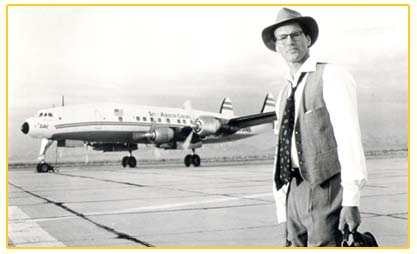
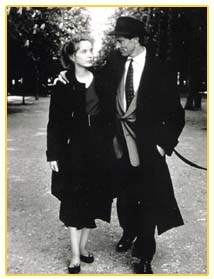
Nema komentara:
Objavi komentar